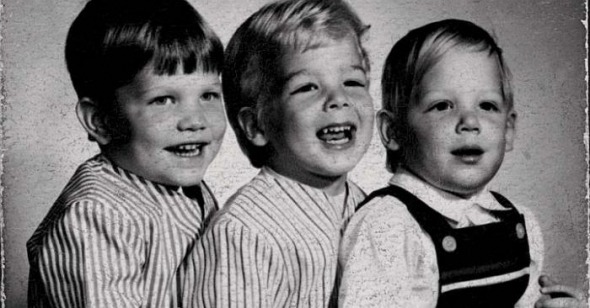Twists and Shouts
by Michael Koresky
Prodigal Sons
Dir. Kimberly Reed, U.S., First Run Features
In the first twenty or so minutes of Kimberly Reed’s marvelous documentary Prodigal Sons, the film’s director, who is also one of its main subjects, returns to her small Montana hometown to attend a high-school reunion. En route, she is reunited with her adopted older brother, Marc, with whom she casually mentions she has been estranged for over a decade. Soon, the first bombshell, uttered by Marc from the backseat of a car: his sister Kim, our narrator, used to be his brother, Paul. A third child, Todd, will waft in and out of conversation and the movie itself. Shot in perfunctory home video style with the occasional Big Sky Country visual interlude, these early scenes would seem to establish the film in predictable personal-diary doc territory—and though the structure and aesthetics of the film will not necessarily come to refute this impression, Prodigal Sons turns out to be so much more.
Before the film takes the first of its many subsequent twists and turns (of the outlandish type that would truly only work in nonfiction), it manages to make the most of its comparatively hushed opening moments. This fish-out-of-water is confronted with no small-American-town scowling here: when Kim meets up with old flames and friends, many of whom have not seen her since her operation, she’s greeted largely with jocular acceptance. Reed’s cinematographer, John Keitel, follows her amidst downtime with family and reunited pals with unobtrusive interest, catching pieces of conversation that tell Kim’s broader story, which is, even on its own terms, unusual: as Paul, she had been a former football quarterback star and valedictorian, and was and is still attracted to women. Thus far, this startling tale of resilience and transformation contains enough drama to sustain a feature film; yet as Reed’s deftly mounted tale soon makes clear, it is the emotionally distraught Marc who will become the de facto protagonist. Reed’s most magnanimous gesture is to acknowledge Marc’s psychosis as a locus of shattered identity as worthy of investigation, and empathy as her own.
Tattered home movies betray a happy, well-adjusted childhood, but the thirtysomething Marc we see in this movie is deeply troubled. Five years after escaping a car accident in his early twenties, Marc began to have seizures, followed by short-term memory loss, resulting in brain surgery from which he never quite recovered. Keitel’s camera captures some of Marc’s erratic, in-between-meds behavior, including one early moment of frightening destruction (to be mirrored in a pair of truly terrifying late scenes, caught on the fly). Exacerbated by his leftover resentment against teenage Paul, his anger at the world is deep-seated; Paul was the popular, booksmart jock to Marc’s shlubby, underachieving everyguy (at one point, Reed revealingly intones, “Marc would give anything to be the man I’d have given anything not to be”). Yet like Kim, Marc is also full of surprises, such as his odd ability to fluidly, emotionally play piano without ever having been able to read music or understand chords. In the course of the film, Marc will find out who his birth parents were, the discovery of which leads Prodigal Sons into entirely another narrative realm that will have cinephiles clucking with delight—and which, though rather unceremoniously placed in the center of the film, was Reed’s impetus for setting out on this project. (It’s better not to ruin this development, though many critics will undoubtedly make it the linchpin of their reviews.)
Besides its undeniably juicy story, perhaps what most distinguishes Prodigal Sons, and what makes its point of view so valuable, is that it’s imbued with the non-patronizing, searching voice of a transgender filmmaker. Inelegant as it may seem to call out such specifics, and to project such gender identities on to the film, try to imagine any other filmmaker attempting to get this close to such tricky territory, and the detached, even condescending attitude that can come from even the most well-meaning director. Prodigal Sons, rather, is constantly negotiating issues of self-definition with intensely personal rumination; particularly fascinating is Kim’s anger at Marc for showing pictures of her as a young Paul, her shyness and hesitancy contrasted baldly with the x-ray of a movie she’s in the process of shooting.
Prodigal Sons plumbs the depths of its principals so thoroughly that one ends up praying for a deliverance, a deus ex machina that will help eradicate the past. Of course, that may never come. Perhaps the most devastating moment, and the film’s clearest instant of awareness of the difficulty of self-identification, comes when one character thanks another “for loving me for who and what I am.” The fact that it is Marc who says this—in a documentary about and by his transgender sister—is rather remarkable.
